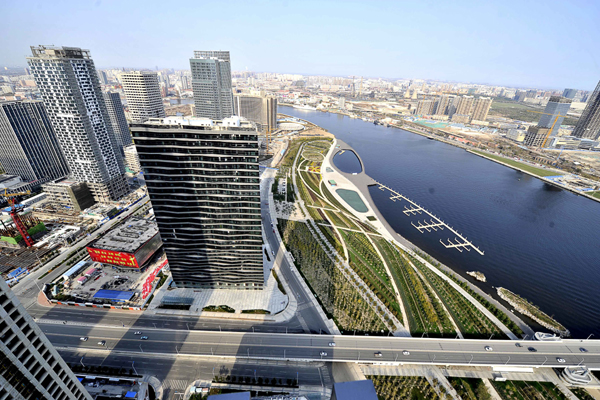Tianjin fosters speedy business approvals
By YANG CHENG in Tianjin | CHINA DAILY | Updated: 2019-12-09 09:00

When Alexander the Great was asked to solve the problem of the Gordian knot-a complex woven rope that nobody could unravel-he succeeded where countless wise men had failed.
His solution? He pulled out his sword and with one mighty whack cut the rope. Problem solved.
The Gordian knot is often used as a metaphor for complex problems that defy solutions-such as the difficulties one might encounter when dealing with big government bureaucracy. Now and then, a modern Alexander rises up to clear the way.
That's what happened in Tianjin, where the government has cut a Gordian knot that formerly frustrated people wanting to start a business.
Xing Shengguo, general manager of Tianjin Dezheng Human Resources, a labor dispatcher, was delighted when he received what he said was the fastest approval he had ever seen in his 10 years in the sector.
"I got the permit within two days online," he said. "The government supported me with its intelligent self-service process in Binhai New Area. I was the first one to get a permit in the city through the new service, and I was impressed. It had been a slow and difficult procedure before."
Tianjin's efforts followed decisions made at a meeting of the central committee for deepening overall reform, led by Xi Jinping, general secretary of the Communist Party of China Central Committee, in March last year, when a key guideline on further streamlining government procedures was approved.
Xing Kai, assistant to the general manager of a joint venture, Tianjin Rise Sun Mengguli New Energy Science & Technology, said that all his headaches cleared up in April after Tianjin officials intervened when his company was preparing to expand in Baodi Jiuyuan Industrial Park.
Two years ago, the company set up an industrial center for batteries in the park, with a promised investment of 7 billion yuan ($994.3 million). Last year, it was considering setting up a second and third phase of the center, but Xing worried about the hurdles of redundant government procedures and unnecessarily elaborate formalities.
Zhao Hongwei, director of Tianjin's government service office, visited the site in March and showed various authorities how to avoid procedural redundancy.
After they coordinated, Xing said, the project's second and third phases were approved "smoothly" in April, and the project was launched the same day.
The two cases illustrate Tianjin's campaign since last year to standardize its business approval process and make access to government services more efficient and convenient.
Over the past year, the city has significantly reduced its red tape. It has amended around 50 regulations and policies and streamlined a number of procedures involving business approvals and project amendments, combining a number of processes.
"For businesses proposed in Binhai New Area, the Binhai authorities have been able to grant approvals as of this year," Zhao said. "Companies no longer need to constantly travel to the downtown area for city-level government permits."
By the end of this year, 5,506 items will no longer need to be submitted to the government. Online service portals using artificial intelligence can handle up to 109 kinds of requests pertaining to the establishment of new businesses.
"In the future, we will strive to optimize Tianjin's business climate and constantly improve governance," Zhao said.
Since the beginning of this year, the number of new companies registered in Tianjin has risen by 20.8 percent year-on-year, with fixed asset investment surging by 15.4 percent.
Liu Dongshui, deputy director of the Tianjin Development and Reform Commission, said Tianjin's private businesses lag behind those in southern China, and that a better business climate and more efficient government services will help the city's economy take off.
























